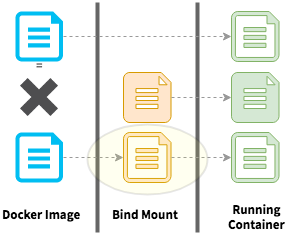
#DOCKER RUN IMAGE WITH VOLUME INSTALL#
You could install packages with pip commands in your Dockerfile, using a requirements.txt, or even using Poetry.Īnd then you can upgrade those dependencies in a controlled way, running your tests, making sure that everything works, but without breaking your production application if some new version is not compatible. This way you can make sure your app always works as expected. You will probably also want to add any dependencies for your app and pin them to a specific version, probably including Uvicorn, Gunicorn, and FastAPI. You will see the alternative automatic documentation (provided by ReDoc): You will see the automatic interactive API documentation (provided by Swagger UI):Īnd you can also go to or (or equivalent, using your Docker host). Now you can go to or (or equivalent, using your Docker host). You can use this image as a base image for other images, using this in your Dockerfile: You don't need to clone the GitHub repo.Useful for APIs and other cases: data validation, data conversion, documentation with OpenAPI, dependency injection, security/authentication and others. Note: FastAPI is based on Starlette and adds several features on top of it.

If you are creating a new Starlette web application and you want to discard all the additional features from FastAPI you should use tiangolo/uvicorn-gunicorn-starlette instead. There is a sibling Docker image: tiangolo/uvicorn-gunicorn-starlette If you feel confident about your knowledge of Uvicorn, Gunicorn and ASGI, you can use that image directly. This image just installs FastAPI and has the documentation specifically targeted at FastAPI. That image is what actually does all the work. This image ( tiangolo/uvicorn-gunicorn-fastapi) is based on tiangolo/uvicorn-gunicorn. If you want one of those, use one of the tags from above. There is also a slim version and another one based on Alpine Linux. It has sensible defaults, but you can configure it with environment variables or override the configuration files. This image will set a sensible configuration based on the server it is running on (the amount of CPU cores available) without making sacrifices. * estimation based on tests on an internal development team, building production applications. Standards-based: Based on (and fully compatible with) the open standards for APIs: OpenAPI (previously known as Swagger) and JSON Schema.With automatic interactive documentation. Multiple features from each parameter declaration. Easy: Designed to be easy to use and learn.Less bugs: Reduce about 40% of human (developer) induced errors.Fast to code: Increase the speed to develop features by about 300% to 500% *.Fast: Very high performance, on par with NodeJS and Go (thanks to Starlette and Pydantic).FastAPIįastAPI is a modern, fast (high-performance), web framework for building APIs with Python 3.6+.

That way, you get the best of concurrency and parallelism. You can use Gunicorn to manage Uvicorn and run multiple of these concurrent processes.
#DOCKER RUN IMAGE WITH VOLUME CODE#
It runs asynchronous Python web code in a single process.

Uvicorn is a lightning-fast "ASGI" server. This image has an "auto-tuning" mechanism included, so that you can just add your code and get that same high performance automatically. The achievable performance is on par with (and in many cases superior to) Go and Node.js frameworks. Optionally in a slim version or based on Alpine Linux.įastAPI has shown to be a Python web framework with one of the best performances, as measured by third-party benchmarks, thanks to being based on and powered by Starlette. uvicorn-gunicorn-fastapiĭocker image with Uvicorn managed by Gunicorn for high-performance FastAPI web applications in Python 3.6 and above with performance auto-tuning.

tiangolo/uvicorn-gunicorn-fastapi:python3.7. If you need to "pin" the Docker image version you use, you can select one of those tags. Note: Note: There are tags for each build date. Supported tags and respective Dockerfile links


 0 kommentar(er)
0 kommentar(er)
